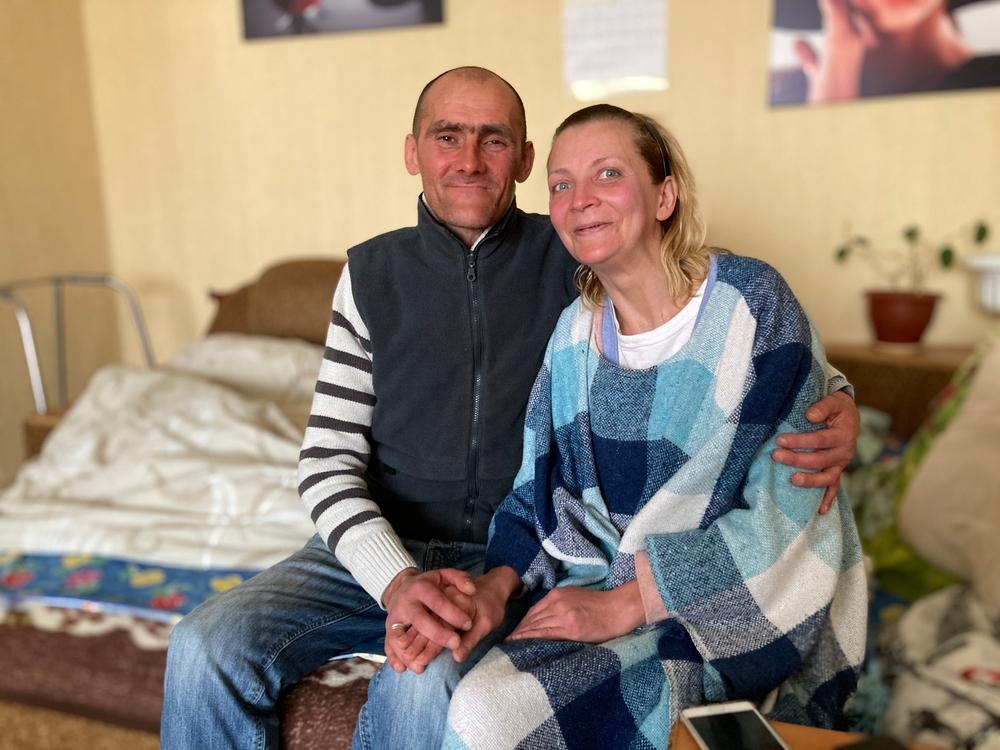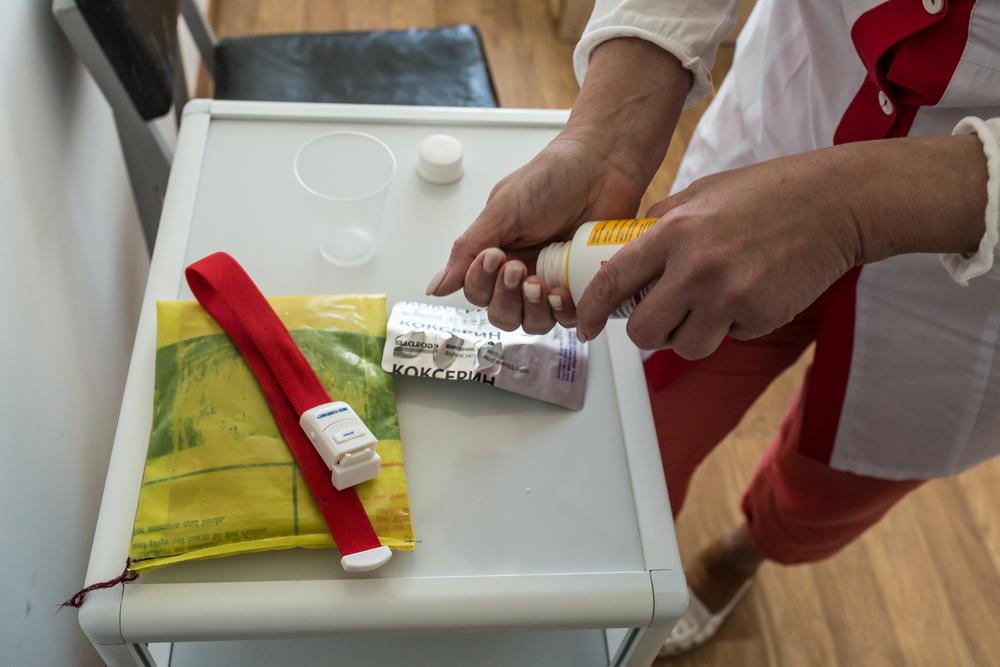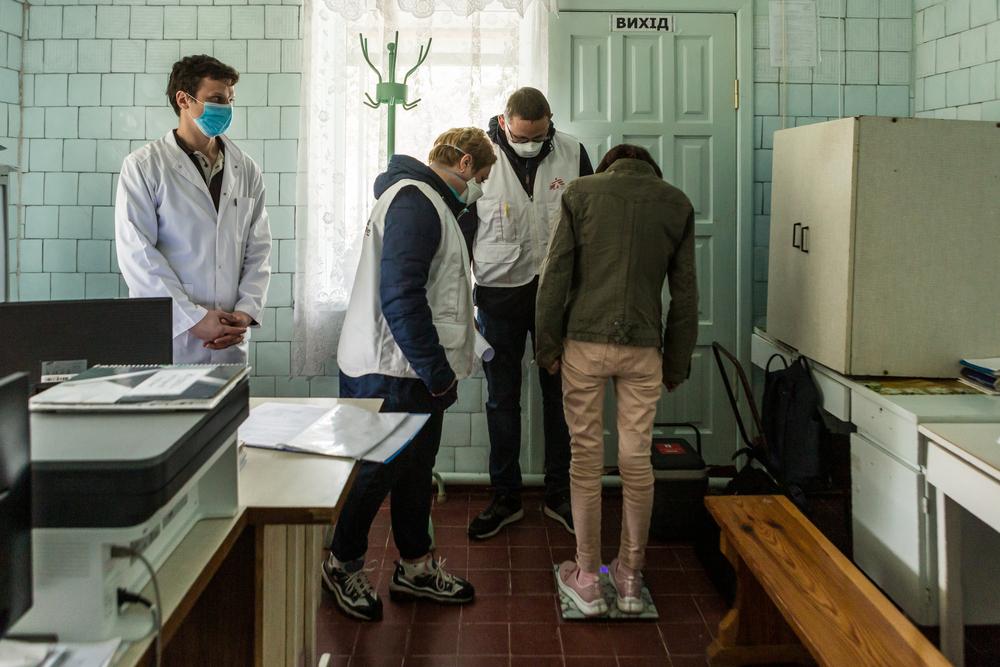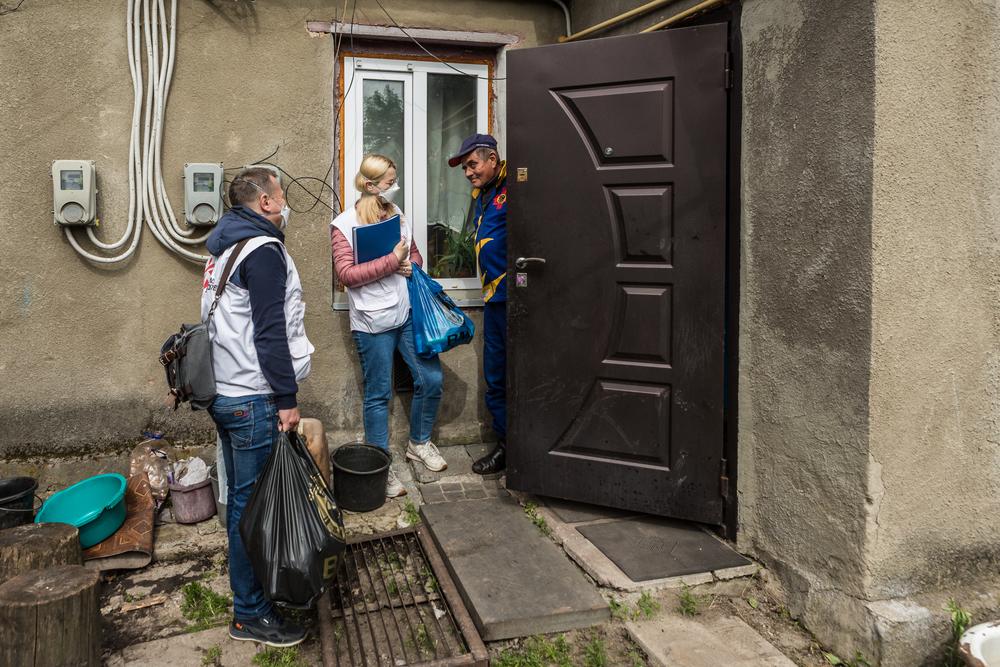TB survivors finding love and other cures in Ukraine

Natasha Mostova and Sergey Khomynskyi, DR-TB survivors, in their home in Zhytomyr, Ukraine in February 2021. © Nitin George/MSF
Little did Sergey realise that a trip to the refrigerator would herald a memorable day. On that early August morning in Ukraine last year, a groggy 40-year-old Sergey met Natasha. Unbeknownst to him at the time, he had just met his future wife. Finding love was unexpected, and came in the least likely of all places – the Regional Tuberculosis (TB) Dispensary in Zhytomyr, 140 kilometres from the capital Kyiv.
In 2001, Sergey was suffering from pneumonia and sepsis in his lungs. “I was diagnosed with TB. What made it more difficult was that I was also addicted to drugs. Things were tough. I was in and out of prison, my wife had died from TB and alcohol addiction, and I had lost custody of my son”, explains Sergey.
In 2020, a chance encounter with MSF’s social worker Vitaliy convinced Sergey to enter the treatment programme for patients with multi-drug resistant tuberculosis (MDR-TB), a collaboration between the Regional TB Dispensary in Zhytomyr and Médecins Sans Frontières (MSF).

A nurse readies pills for a DR-TB patient in the TB facility in Novograd-Volynsk district, Zhytomyr region, Ukraine. In order to enhance patient autonomy, MSF’s programme offers a combination of directly-observed (DOT), video-observed (VOT) and self-administered (SAT) therapies, depending on the needs and capacity of the patients. In directly-observed and video-observed therapies, a trained health worker observes patients swallow prescribed drugs, either in person or through video-enabled smartphones. © Oksana Parafeniuk/MSF
Despite an overhaul in TB health policy, until a few years ago patients in Ukraine had to spend 12 to 24 months in dedicated TB health facilities. Existing treatment for drug-resistant forms of TB is still not easy to withstand as it can require daily injections and combinations of drugs that can result in moderate to severe side effects (like fatigue to neurological effects in some cases).
A prolonged hospital stay also comes at a cost: separation from family and community support, often combined with loss of employment and income. TB survivors like Sergey, former prisoners with a history of substance-use, occupy the lowest ranks of socio-economic hierarchies in Ukraine and are often not able to start and/or complete hospital-centred TB treatments.

MSF nurse Anna Antypenko and MSF social worker Oleksandr Nazin (middle, dressed in blue) check a DR-TB patient’s weight in Korostyshiv district, Zhytomyr region, Ukraine. Nurses and social workers like Anna and Oleksandra are part of MSF’s patient support team who along with psychologists work with DR-TB patients to understand and resolve potential barriers to continuing treatment, ranging from unpaid pensions to lack of gas or heating in homes. © Oksana Parafeniuk/MSF
Incomplete TB treatment poses a serious risk, as it is linked to the emergence of drug-resistant forms of the disease. According to the World Health Organisation in 2018, the proportion of DR-TB patients amongst newly confirmed TB patients in Ukraine was 29 per cent, and 46 per cent amongst previously treated patients. This rate is high in comparison to other countries in Europe and is a significant public health challenge.
The Regional TB Dispensary, aims to reverse this trend through an operational research programme supported by MSF. The study advocates for a patient-centred model by showcasing the numerous
advantages offered by shorter treatment plans lasting between nine and 12 months and highly effective all-oral regimens including bedaquiline and delamanid, which cause fewer severe side effects than the older drugs. Many patients in this programme also receive treatment for co-morbidities like hepatitis C, HIV and alcohol or substance-use disorders.
A patient-centred health approach also prioritises the individual needs of the patients.
It is also vital to strengthen outpatient care, so patients can stay with their families and communities while receiving treatment. Being able to return home and continue the medication increases the chance of patients completing their treatment. MSF’s patient support teams made up of nurses, social workers and psychologists, work with DR-TB patients to understand and resolve potential barriers to continuing treatment, ranging from unpaid pensions to lack of gas or heating in homes.
Discharged from the Regional TB Dispensary in October 2020, Sergey and Natasha got married that December. They completed their treatment in January 2021. Today, they dream of building a house with a small garden and buying a car to travel the world.

MSF social worker Oksana Vykhivska and MSF nurse Oleksandr Vovkogon deliver food parcels to Vitalii Gorbachov, 56, at his home in Chudniv district in Zhytomyr region, Ukraine. Nurses and social workers are part of MSF’s patient support team who along with psychologists work with DR-TB patients to understand and resolve potential barriers to continuing treatment, ranging from unpaid pensions to lack of gas or heating in homes. © Oksana Parafeniuk/MSF